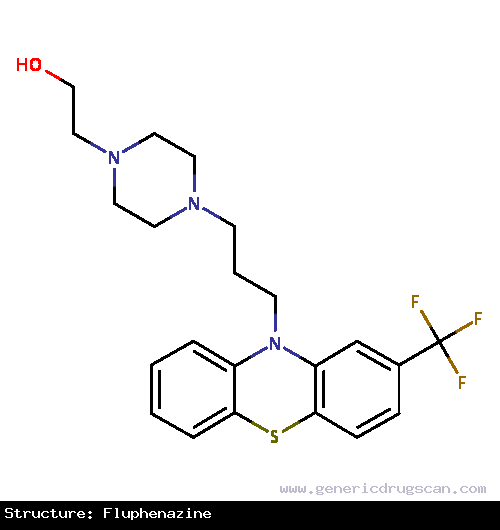Fluphenazine Drug: Indication, Dosage, Precaution, Side Effect , Storage, Category Type and corresponding Brands - www.genericdrugscan.com
Fluphenazine
Drug Status in USA : ApprovedDrug Status in Canada : Approved
pronunciation
pronounced as (floo fen' a zeen)
Why is this medication prescribed?
Fluphenazine is an antipsychotic medication used to treat schizophrenia and psychotic symptoms such as hallucinations, delusions, and hostility.
This medication is sometimes prescribed for other uses; ask your doctor or pharmacist for more information.
How should this medicine be used?
Fluphenazine comes as a tablet or oral liquid (elixir and concentrate) to take by mouth. It is usually taken two or three times a day and may be taken with or without food. Follow the directions on your prescription label carefully, and ask your doctor or pharmacist to explain any part you do not understand. Take fluphenazine exactly as directed. Do not take more or less of it or take it more often than prescribed by your doctor.
Fluphenazine oral liquid comes with a specially marked dropper for measuring the dose. Ask your pharmacist to show you how to use the dropper. Do not allow the liquid to touch your skin or clothing; it can cause skin irritation. Dilute the concentrate in water, Seven-Up, carbonated orange beverage, milk, or V-8, pineapple, apricot, prune, orange, tomato, or grapefruit juice just before taking it. Do not use beverages containing caffeine (coffee, tea, and cola) or apple juice.
Continue to take fluphenazine even if you feel well. Do not stop taking fluphenazine without talking to your doctor, especially if you have taken large doses for a long time. Your doctor probably will want to decrease your dose gradually. This drug must be taken regularly for a few weeks before its full effect is felt.
What are the precautions to be followed?
Before taking fluphenazine,- tell your doctor and pharmacist if you are allergic to fluphenazine or any other drugs.
- tell your doctor and pharmacist what prescription and nonprescription drugs you are taking or have taken within the last 2 weeks, especially antidepressants; antihistamines; bromocriptine (Parlodel); diet pills; lithium (Eskalith, Lithobid); medication for high blood pressure, seizures, Parkinson's disease, asthma, colds, or allergies; meperidine (Demerol); methyldopa (Aldomet); muscle relaxants; propranolol (Inderal); sedatives; sleeping pills; thyroid medications, tranquilizers; and vitamins.
- tell your doctor if you have or have ever had glaucoma, an enlarged prostate, difficulty urinating, seizures, an overactive thyroid gland, or liver, kidney, or heart disease.
- tell your doctor if you are pregnant, especially if you are in the last few months of your pregnancy, or if you plan to become pregnant or are breast-feeding. If you become pregnant while taking fluphenazine, call your doctor. Fluphenazine may cause problems in newborns following delivery if it is taken during the last months of pregnancy.
- if you are having surgery, including dental surgery, tell the doctor or dentist that you are taking fluphenazine.
- you should know that this drug may make you drowsy. Do not drive a car or operate machinery until you know how this drug affects you.
- remember that alcohol can add to the drowsiness caused by this drug.
- tell your doctor if you use tobacco products. Cigarette smoking may decrease the effectiveness of this drug.
What are possible side effects of this medication ?
Side effects from fluphenazine are common:- upset stomach
- drowsiness
- weakness or tiredness
- excitement or anxiety
- insomnia
- nightmares
- dry mouth
- skin more sensitive to sunlight than usual
- changes in appetite or weight
- constipation
- difficulty urinating
- frequent urination
- blurred vision
- changes in sex drive or ability
- excessive sweating
- jaw, neck, and back muscle spasms
- slow or difficult speech
- shuffling walk
- persistent fine tremor or inability to sit still
- fever, chills, sore throat, or flu-like symptoms
- difficulty breathing or swallowing
- severe skin rash
- yellowing of the skin or eyes
- irregular heartbeat
How to store the medication and dispose it of after its use later?
Keep this medication in the container it came in, tightly closed, and out of reach of children. Store it at room temperature and away from excess heat and moisture (not in the bathroom). Throw away any medication that is outdated or no longer needed. Talk to your pharmacist about the proper disposal of your medication.
Drug Category/Class
- Antipsychotic Agents
- Dopamine Antagonists
- Phenothiazines
- Psycholeptics
- Phenothiazines With Piperazine Structure
- Cytochrome P-450 CYP1A2 Inhibitors
- Cytochrome P-450 CYP1A2 Inducers
- CYP2D6 Inducers
- CYP2D6 Inducers (strong)
- CYP2E1 Inhibitors
- CYP2E1 Inducers
- CYP2E1 Inducers (strong)
- Nervous System
- Phenothiazines with piperazine structure
| Prescribed | For management of manifestations of psychotic disorders. |
| Weight : | 437.522 |
| Structure | Fluphenazine |
 | |
| Formula | C22H26F3N3OS |
Fluphenazine has 7 Brands listed
| Anatensol (1 mg) | Anatensol (25 mg) |
| F Tensil (25 mg) | Fludecan (25 mg) |
| Phenodec (25 mg) | Prolinate (25 mg) |
| Synate (25 mg) |
Search Generic Drugs alphabetically
